Publications
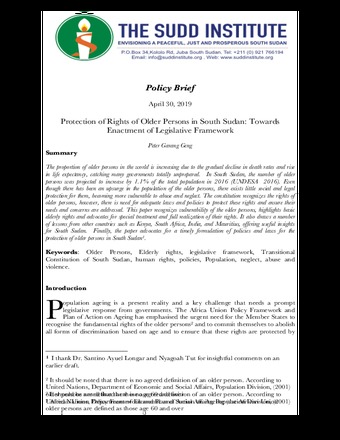
Protection of Rights of Older Persons in South Sudan: Towards Enactment of Legislative Framework
Author: Peter Garang Geng
Organization: The Sudd Institute
Type: Policy Briefs
Date: 06/05/2019
The proportion of older persons in the world is increasing due to the gradual decline in death rates and rise in life expectancy, catching many governments totally unprepared. In South Sudan, the number of older persons was projected to increase by 1.1% of the total population in 2016 (UNDESA 2016).
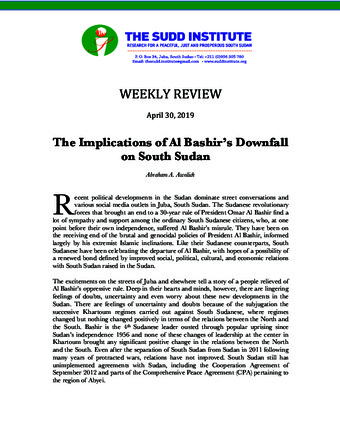
The Implications of Al Bashir’s Downfall on South Sudan
Author: Abraham Awolich
Organization: The Sudd Institute
Type: Weekly Reviews
Date: 30/04/2019
Recent political developments in the Sudan dominate street conversations and various social media outlets in Juba, South Sudan. The Sudanese revolutionary forces that brought an end to a 30-year rule of President Omar Al Bashir find a lot of sympathy and support among the ordinary South Sudanese citizens, who, at...
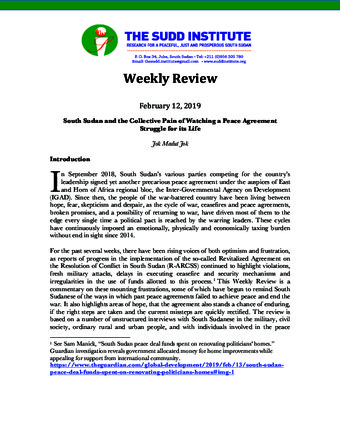
South Sudan and the Collective Pain of Watching a Peace Agreement Struggle for its Life
Author: Jok Madut Jok
Type: Weekly Reviews
Date: 12/02/2019
For the past several weeks, there have been rising voices of both optimism and frustration, as reports of progress in the implementation of the so-called Revitalized Agreement on the Resolution of Conflict in South Sudan (R-ARCSS) continued to highlight violations, fresh military attacks, delays in executing ceasefire and security mechanisms...
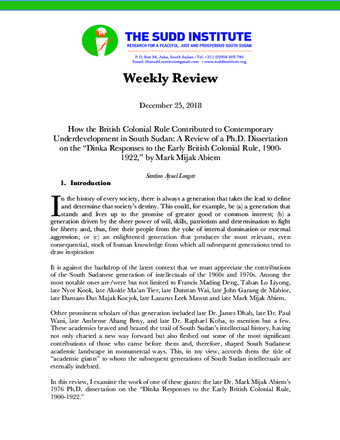
How the British Colonial Rule Contributed to Contemporary Underdevelopment in South Sudan: A Review of a Ph.D. Dissertation on the “Dinka Responses to the Early British Colonial Rule, 1900-1922,” by Mark Mijak Abiem
Author: Santino Ayuel Longar
Type: Weekly Reviews
Date: 25/12/2018
In the history of every society, there is always a generation that takes the lead to define and determine that society’s destiny. This could, for example, be (a) a generation that stands and lives up to the promise of greater good or common interest; (b) a generation driven by the...
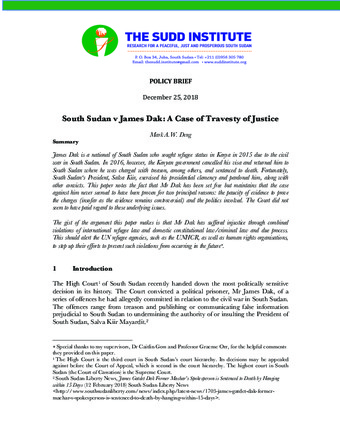
South Sudan v James Dak: A Case of Travesty of Justice
Author: Mark A. Wek Deng
Type: Policy Briefs
Date: 25/12/2018
James Dak is a national of South Sudan who sought refugee status in Kenya in 2015 due to the civil war in South Sudan. In 2016, however, the Kenyan government cancelled his visa and returned him to South Sudan where he was charged with treason, among others, and sentenced to death.
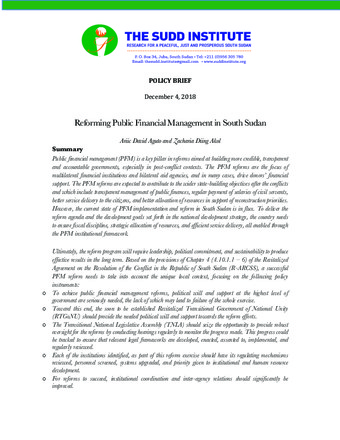
Reforming Public Financial Management in South Sudan
Author: Ariic David Aguto Reng
Type: Policy Briefs
Date: 04/12/2018
Public financial management (PFM) is a key pillar in reforms aimed at building more credible, transparent and accountable governments, especially in post-conflict contexts. The PFM reforms are the focus of multilateral financial institutions and bilateral aid agencies, and in many cases, drive donors’ financial support.
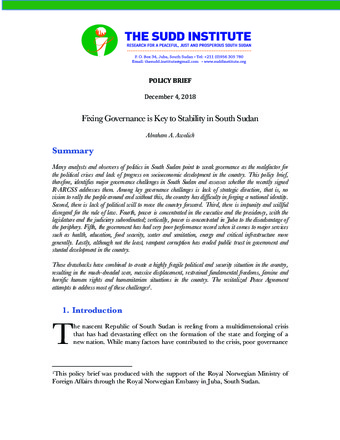
Fixing Governance is Key to Stability in South Sudan
Author: Abraham Awolich
Organization: The Sudd Institute
Type: Policy Briefs
Date: 04/12/2018
Many analysts and observers of politics in South Sudan point to weak governance as the malefactor for the political crises and lack of progress on socio-economic development in the country. This policy brief, therefore, identifies major governance challenges in South Sudan and assesses whether the recently signed R-ARCSS addresses them.
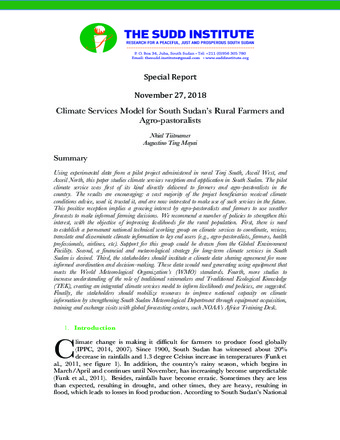
Climate Services Model for South Sudan’s Rural Farmers and Agro-pastoralists
Authors: Nhial Tiitmamer, Augustino Ting Mayai
Type: Policy Briefs
Date: 27/11/2018
Using experimental data from a pilot project administered in rural Tonj South, Aweil West, and Aweil North, this paper studies climate services reception and application in South Sudan. The pilot climate service was first of its kind directly delivered to farmers and agro-pastoralists in the country.
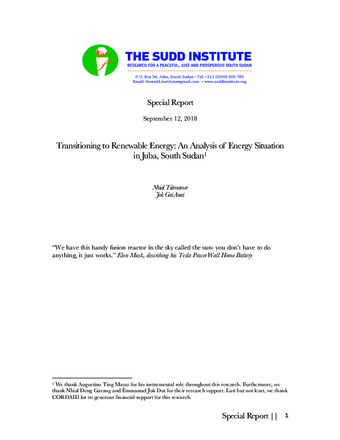
Transitioning to Renewable Energy: An Analysis of Energy Situation in Juba, South Sudan
Authors: Jok Gai Anai, Nhial Tiitmamer
Type: Special Reports
Date: 27/11/2018
South Sudan faces a serious energy crisis due to a number of factors, including devastating conflicts (e.g. 1955-172, 1983-2005 & 2013–present) and reliance on the fossil fuel source. The country has the lowest energy consumption rate in Africa and the highest cost of producing energy (World Bank, 2016).
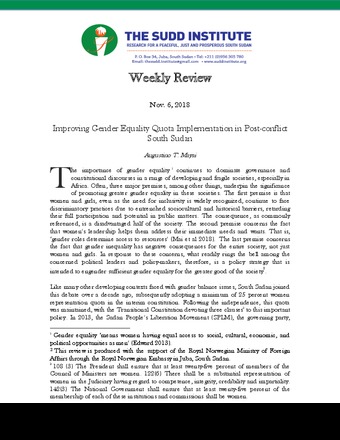
Improving Gender Equality Quota Implementation in Post-conflict South Sudan
Author: Augustino Ting Mayai
Type: Weekly Reviews
Date: 06/11/2018
In 2005, South Sudan adopted a minimum of 25 percent women representation quota in its interim constitution. Following the independence, this quota was maintained, with the Transitional Constitution devoting three clauses to this important policy. In 2013, the Sudan People’s Liberation Movement (SPLM), the governing party, proposed raising this quota...
